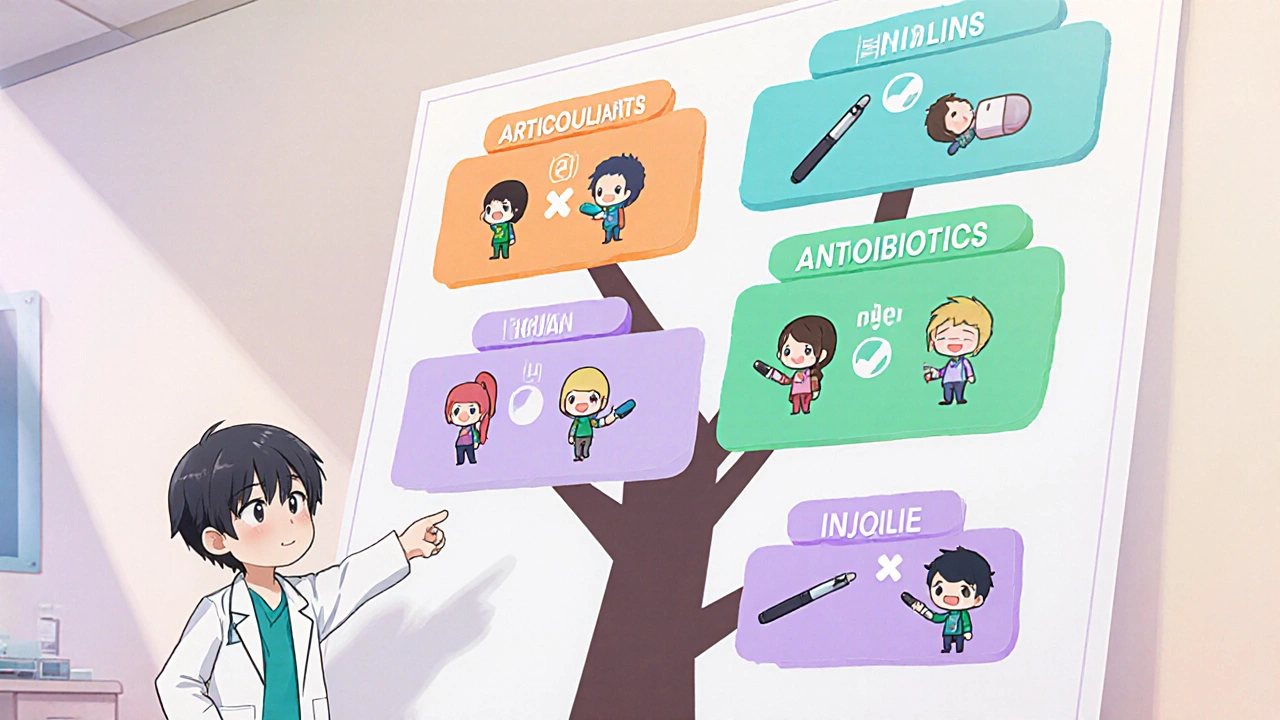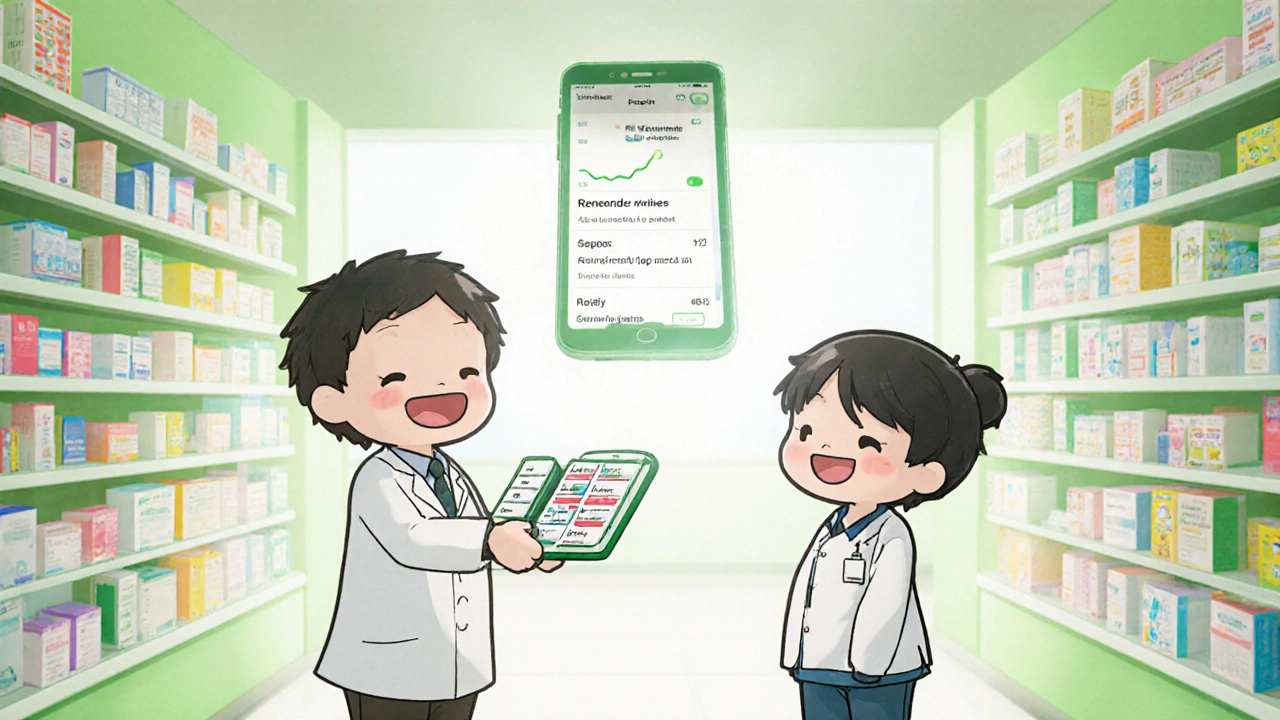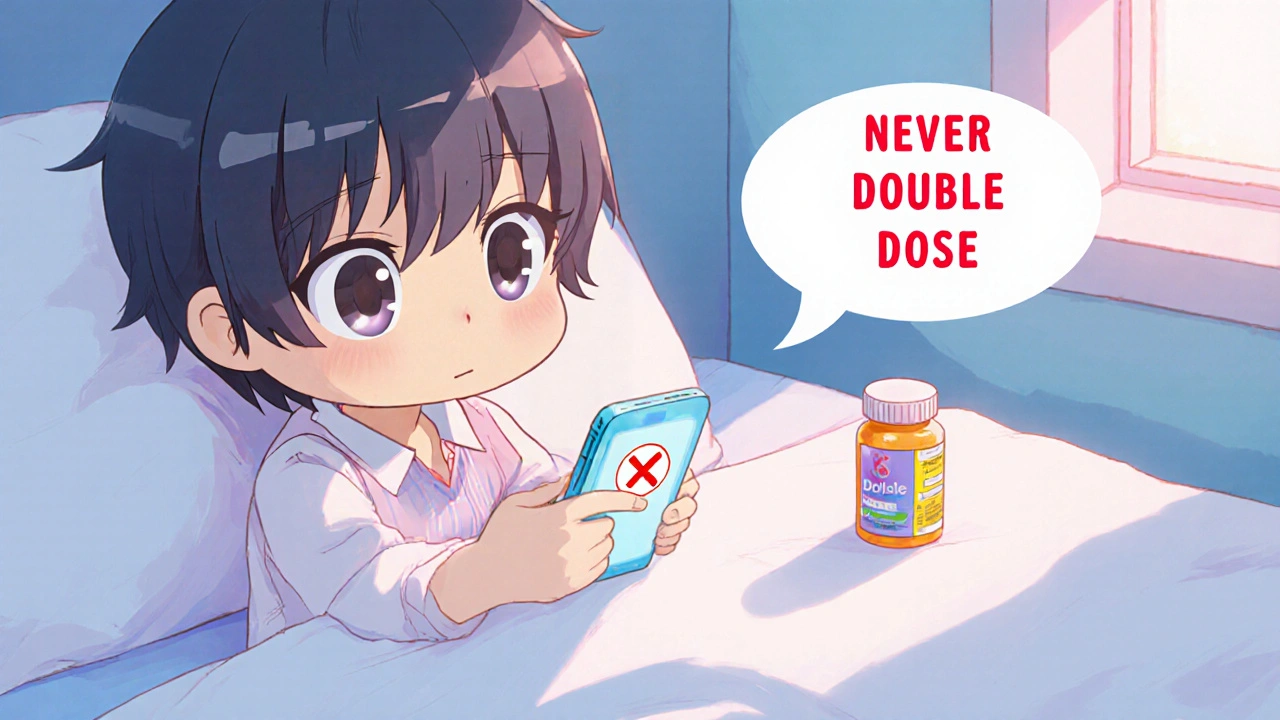Quick Takeaways
- Never double‑dose a medication unless the drug label specifically says it’s safe (e.g., combined oral contraceptives).
- If more than half the dosing interval has passed, skip the missed dose and resume the regular schedule.
- High‑alert drugs - anticoagulants, insulin, anti‑epileptics, immunosuppressants - require immediate clinician contact if a dose is missed.
- Use a medication‑specific decision tree: timing, drug class, and patient condition dictate the next step.
- Smartphone reminders and pharmacist‑led counseling cut missed‑dose errors by up to 40%.
Why a One‑Size‑Fits‑All Rule Doesn't Work
Medication adherence isn’t just about remembering to swallow a pill. The clinical impact of a missed dose depends on how the drug works in the body (pharmacokinetics), how narrow its therapeutic window is, and what disease it treats. A 15‑minute slip for rapid‑acting insulin can cause dangerous hyperglycaemia, while the same delay for a once‑daily ACE inhibitor usually has minimal effect.
Guidelines from NICE, the American Heart Association, and the FDA all agree on a core principle: avoid double‑dosing. But they also split drugs into categories that demand different actions. That’s why a decision tree - a visual or logical flow that asks a few simple questions - is the safest way to respond.
Universal Rules That Apply to Almost Every Drug
- Check the time elapsed since the scheduled dose.
- If less than 50 % of the dosing interval has passed, you may take the dose now (unless the drug is a ‘no‑catch‑up’ med).
- If more than 50 % of the interval has passed, skip the missed dose and continue with the next scheduled dose.
- Never take two doses at once unless the package insert explicitly allows it (e.g., combined oral contraceptives).
- Report any missed dose of a high‑alert medication to a healthcare professional within 24 hours.

Medication‑Specific Decision Trees
The following sections walk you through the most common drug classes. For each, we start with a brief description, then list the exact steps to follow when a dose is missed. The first mention of each drug is marked up with schema.org Thing microdata so search engines can recognise the key entities.
Anticoagulants
Warfarin is a vitamin K antagonist used to prevent clot formation. If you realize you missed a dose before midnight, take it right away. After midnight, skip the dose completely - do not double up. Apixaban and Rivaroxaban are direct oral anticoagulants (DOACs). Take the missed dose if you’re within 6 hours of the scheduled time; otherwise, skip it and keep the regular schedule.
Diabetes Medications
Rapid‑acting insulin (e.g., Humalog) is meant to be taken within 15 minutes of a meal. If you forget, do NOT inject later; instead, monitor blood glucose and follow your provider’s correction plan. For long‑acting insulin such as Lantus, if you’re more than 2 hours late, call your clinician before taking another dose. Oral agents: Metformin can be taken up to 2 hours late; Glipizide (a sulfonylurea) should be skipped to avoid hypoglycaemia.
Cardiovascular Drugs
Metoprolol (beta‑blocker) may be taken within 4 hours of the missed time; if closer to the next dose, skip it. Lisinopril (ACE inhibitor) follows a similar 4‑hour rule but is less risky if delayed.
Anti‑arrhythmic Amiodarone demands strict adherence - any missed dose requires immediate medical advice.
Loop diuretic Furosemide taken in the morning should be taken before 2 PM; after that, wait for the next scheduled dose to avoid nocturia.
Seizure Medications
Levetiracetam (often dosed twice daily) should be taken within 6 hours of the missed time. If the next dose is less than 6 hours away, skip the missed dose to prevent excess levels. Missing two consecutive doses mandates contacting a neurologist.
Immunosuppressants (Transplant)
Tacrolimus requires immediate notification of the transplant team for any missed dose because rejection risk spikes within 30 days of non‑adherence.
Antibiotics
Time‑dependent agents like Penicillin should be taken as soon as remembered if within 2 hours of the scheduled time; otherwise, skip and continue the regular interval. Concentration‑dependent antibiotics (e.g., aminoglycosides) need clinician contact before any adjustment.
Hormonal Contraceptives
For combined oral contraceptives, if you miss one active pill, take two pills immediately (the missed one plus the scheduled dose) and continue with the next pill at the usual time. Use backup contraception for the next 7 days. Missing two or more active pills follows a multi‑step protocol that varies by formulation.
Psychotropic Medications
Selective serotonin reuptake inhibitors like Sertraline generally do not need catch‑up; just skip and resume. Monoamine oxidase inhibitors (e.g., Phenelzine) require immediate provider contact if a dose is missed because re‑starting can trigger hypertensive crises.
Quick Reference Table
| Medication Class | Typical Dosing Interval | Action if < 50 % interval elapsed | Action if > 50 % interval elapsed |
|---|---|---|---|
| Warfarin (VKA) | 24 h | Take immediately (if before midnight) | Skip; do NOT double dose |
| DOACs (Apixaban, Rivaroxaban) | 12 h | Take if within 6 h | Skip; resume schedule |
| Rapid‑acting insulin | With meals | Take if within 15 min of food | Do NOT take; monitor glucose |
| Long‑acting insulin | 24 h | Take if ≤2 h late | Call clinician before dosing |
| Beta‑blocker (Metoprolol) | 24 h | Take if ≤4 h late | Skip; avoid bradycardia |
| Antiepileptic (Levetiracetam) | 12 h | Take if ≤6 h late | Skip; seek urgent advice if 2 doses missed |
| Combined oral contraceptive | 24 h | Take missed pill now + scheduled pill | Follow multi‑pill algorithm |
Tools That Help You Stay on Track
Smartphone apps like Medisafe, pill‑boxes with timed compartments, and pharmacy‑led counseling have proven to boost adherence. A 2023 JMIR study showed a 32.7 % rise in on‑time dosing when patients used reminder apps compared with paper lists. If you’re on polypharmacy (four or more meds), consider a digital app that can store medication‑specific missed‑dose rules - many now pull the exact timing guidance from FDA labeling.

Common Pitfalls and How to Avoid Them
- Doubling up. Only hormonal contraceptives allow a double dose. For everything else, a double dose can cause toxicity or serious cardiac events.
- Relying on vague package inserts. Look for specific timing language (e.g., “within 6 hours”) rather than generic “as soon as possible.”
- Skipping the doctor’s call. High‑alert drugs require professional guidance; a missed call can lead to hospitalization.
- Not writing down the missed dose. A simple log helps your clinician see patterns and adjust therapy if needed.
Frequently Asked Questions
What should I do if I forget a single warfarin dose?
If you remember before midnight, take it right away. After midnight, skip it and do NOT take two pills at once. Check your INR the next day and inform your clinic if you’re unsure.
Can I take a missed insulin dose later in the day?
For rapid‑acting insulin, no. Take it only within 15 minutes of a meal. If you miss it, monitor glucose and follow your corrective‑dose plan. Long‑acting insulin may be taken if only a couple of hours late; otherwise, call your diabetes nurse.
Is it ever safe to double a dose of a blood pressure medicine?
Generally no. For beta‑blockers or ACE inhibitors, taking a double dose can cause dangerously low blood pressure or heart rate. Follow the 50 % interval rule and skip if you’re too close to the next dose.
How urgent is it to call a doctor after missing a tacrolimus dose?
Very urgent. A missed tacrolimus dose raises the risk of organ rejection within days. Contact your transplant team immediately - they may advise a supplemental dose or adjust monitoring.
What’s the rule for combined oral contraceptives if I miss two pills?
If you miss two active pills, take the most recent missed pill as soon as you remember, skip any other missed pills, then continue with the next scheduled pill. Use backup contraception for 7 days and consider a short‑term hormonal method if you’re far into the cycle.
Next Steps If You’re Unsure
When the decision tree doesn’t give a clear answer, follow this fallback plan:
- Call the pharmacy that dispensed the medication - they have the label’s exact wording.
- Contact your primary care provider or specialist within 24 hours for high‑alert drugs.
- Document the missed dose, time discovered, and any actions taken. This record helps future appointments.
- Set up a reminder system (app, alarm, pill‑box) that includes the specific timing rule for each drug.
Staying proactive reduces the chance that a simple slip becomes a medical emergency.

10 Comments
Brett Witcher
When contemplating the ramifications of a missed dose, one must first acknowledge the pharmacokinetic intricacies that underlie each therapeutic agent. The temporal proximity to the next scheduled administration dictates whether a catch‑up dose is physiologically permissible or deleterious. For high‑alert medications such as anticoagulants, the decision tree mandates a stringent adherence to the 50 % interval rule, thereby precluding any form of dose duplication. Conversely, agents with expansive therapeutic windows, exemplified by certain ACE inhibitors, tolerate modest temporal deviations without precipitating adverse events. It is incumbent upon the patient to internalise the specific language embedded within the FDA label – phrases such as ‘within 6 hours’ or ‘as soon as possible’ are not mere suggestions but actionable directives. Should a rapid‑acting insulin dose be omitted beyond the 15‑minute window, the physiologic sequelae may include marked hyperglycaemia, necessitating a pre‑emptive correction protocol rather than a belated injection. Long‑acting insulins, by virtue of their basal profile, permit a brief grace period of up to two hours, beyond which clinician consultation becomes imperative. Beta‑blockers, including metoprolol, exemplify drugs wherein premature re‑dosing can precipitate bradyarrhythmias, reinforcing the prudence of the skip‑if‑close‑to‑next‑dose heuristic. In the realm of hormonal contraception, the nuanced algorithm permits a double‑pill intake solely for the combined oral formulation, a singular exception to the overarching prohibition against dose stacking. Immunosuppressants, notably tacrolimus, occupy the apex of clinical urgency; any lapse must be reported instantly due to the heightened risk of graft rejection. Finally, the utilisation of digital adherence tools, ranging from app‑based reminders to pharmacist‑led counselling, demonstrably mitigates the incidence of missed doses, thereby operationalising the decision tree in everyday practice.
Benjamin Sequeira benavente
Alright, folks, here’s the game plan: if you’re under that 50 % threshold, pop that pill right now and keep the momentum going. If you’re past half the interval, just let it slide and move on – no need to panic or double up. Stay proactive, set a phone alarm, and keep that confidence high. Remember, consistency beats chaos every time.
Shannon Stoneburgh
Honestly, most people ignore the simple rule and end up in trouble. Skip the dose when you’re too close to the next one – that’s basic logic. If you keep messing up, you’re just asking for a bad outcome.
Bianca Larasati
Imagine the drama of a missed dose turning into a hospital visit – not cool. Grab your pillbox, set that reminder, and own your health. You’ve got the power to dodge those pitfalls, so make it happen now.
Corrine Johnson
Ah, the labyrinth of missed‑dose protocols; one must ponder the very essence of temporal compliance – does the clock truly dictate destiny, or do we, as sentient beings, wield agency over pharmacologic fate??? Let us not trivialise the gravity of a 6‑hour lapse; contemplate, then act.
the sagar
Ignore the agenda, the meds are poisoned.
Clinton Papenfus
Esteemed community, I respectfully advise the adoption of a structured reminder system to ensure adherence to the prescribed dosing schedule; this practice is both prudent and efficacious.
Zaria Williams
hey yall, dont be lazy with ur meds. set a alarm on ur phone or put a sticky note on the frigde. if u forget a dose of insulin you got real probs, so act fast.
ram kumar
Oh, the tragedy of another missed pill – the drama unfolds! Yet, the truth is simple: you either follow the tree or you spiral into chaos. Choose wisely, lest the repercussions be as theatrical as they are severe.
Charlie Stillwell
Utilising the decision‑tree paradigm in pharmacotherapy constitutes a synergistic optimization of therapeutic indices; failure to comply precipitates suboptimal outcomes 🚨💊. Align your dosing regimen with evidence‑based algorithms to mitigate iatrogenic risk.